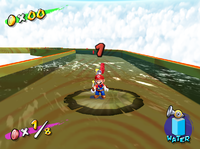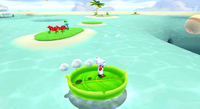Leaf raft: Difference between revisions
m (Reverted edits by Mario jc (talk) to last revision by Doc von Schmeltwick) Tag: Rollback |
(Undo revision 3241436 by 73.170.189.126 (talk) Those are just lilypads, and please don't add duplicate notices.) Tag: Undo |
||
| Line 1: | Line 1: | ||
{{image|Sprite/render of a lily pad/Leaf Raft}} | {{image|Sprite/render of a lily pad/Leaf Raft}} | ||
{{item-infobox | {{item-infobox | ||
| Line 18: | Line 17: | ||
A [[Pianta]] in this galaxy opens his "Leaf Raft Shop" for business in the mission [[Climbing the Cloudy Tower]], which is the only time they can be used. The player can use them to cross the large body of water in this galaxy without actually touching the water. This is essential in the aforementioned mission, where the player as [[Cloud Mario]] or Cloud Luigi must ride across the water using Leaf Rafts to successfully reach the large tower where the [[Power Star]] is located. | A [[Pianta]] in this galaxy opens his "Leaf Raft Shop" for business in the mission [[Climbing the Cloudy Tower]], which is the only time they can be used. The player can use them to cross the large body of water in this galaxy without actually touching the water. This is essential in the aforementioned mission, where the player as [[Cloud Mario]] or Cloud Luigi must ride across the water using Leaf Rafts to successfully reach the large tower where the [[Power Star]] is located. | ||
{{br|left}} | {{br|left}} | ||
Revision as of 21:34, July 23, 2021
It has been requested that at least one image be uploaded for this article. Remove this notice only after the image(s) have been added. Specific(s): Sprite/render of a lily pad/Leaf Raft
Template:Item-infobox Leaf Rafts[1] (alternatively known as lily pads) are floating rafts made of giant leaves. They appear in a few Mario platformers.
History
Super Mario Sunshine
Leaf Rafts first appear in Super Mario Sunshine, appearing in some areas of Bianco Hills as well as the Lily Pad Ride secret area. To use one, Mario must jump on one, and then use F.L.U.D.D. to push the Leaf Rafts in the direction he wishes to go. The Leaf Rafts will then begin to move forward, and will continue to do so until Mario stops spraying, at which point it will gradually slow to a stop. In The Secret of the Dirty Lake and the Lily Pad Ride, the Leaf Rafts are brown from the poison water they are in and begin to slowly wilt away when Mario lands on them, eventually disappearing.
Super Mario Galaxy 2
Leaf Rafts reappear in Super Mario Galaxy 2 in the Starshine Beach Galaxy. They behave similar to their appearance in Super Mario Sunshine, but due to the absence of F.L.U.D.D., are now controlled by stepping along the edges the player wants to move them. Relating to this, they now have a high ridge along their perimeters to prevent the player from walking off the edge. They have also been redesigned to look like fallen tree leaves, having a stem on the side and a pointed edge across from it.
A Pianta in this galaxy opens his "Leaf Raft Shop" for business in the mission Climbing the Cloudy Tower, which is the only time they can be used. The player can use them to cross the large body of water in this galaxy without actually touching the water. This is essential in the aforementioned mission, where the player as Cloud Mario or Cloud Luigi must ride across the water using Leaf Rafts to successfully reach the large tower where the Power Star is located.
Names in other languages
| Language | Name | Meaning |
|---|---|---|
| German | Blattboot |
Leaf Boat |
References
- ^ Super Mario Galaxy 2 North American instruction booklet, page 21

